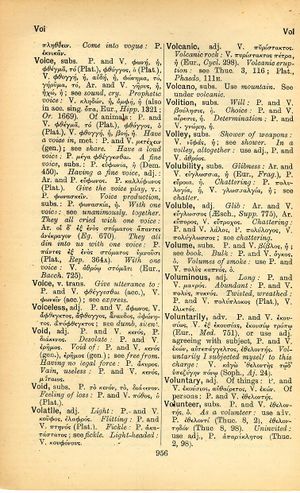voice: Difference between revisions
m (Text replacement - "<b class="b2">Eg.</b>" to "''Eg.''") |
m (Woodhouse1 replacement) |
||
| Line 1: | Line 1: | ||
{{Woodhouse1 | {{Woodhouse1 | ||
|Text=[[File:woodhouse_956.jpg|thumb|link={{filepath:woodhouse_956.jpg}}]] | |Text=[[File:woodhouse_956.jpg|thumb|link={{filepath:woodhouse_956.jpg}}]] | ||
===substantive=== | |||
P. and V. [[φωνή]], ἡ, [[φθέγμα]], τό ( | [[prose|P.]] and [[verse|V.]] [[φωνή]], ἡ, [[φθέγμα]], τό ([[Plato]]), [[φθόγγος]], ὁ ([[Plato]]), [[verse|V.]] [[φθογγή]], ἡ, [[αὐδή]], ἡ, [[φώνημα]], τό, [[γήρυμα]], τό, [[Aristophanes|Ar.]] and [[verse|V.]] [[γῆρυς]], ἡ, [[ἠχώ]], ἡ; see [[sound]], [[cry]]. | ||
[[prophetic voice]]: [[verse|V.]] [[κληδών]], ἡ, [[ὀμφή]], ἡ (also in acc. sing. [[ὄπα]], [[Euripides|Eur.]], ''[[Hippolytus]]'' 1321; Or. 1669). | |||
Of animals: P. and V. [[φθέγμα]], τό ( | Of animals: [[prose|P.]] and [[verse|V.]] [[φθέγμα]], τό ([[Plato]]), [[φθόγγος]], ὁ ([[Plato]]), [[verse|V.]] [[φθογγή]], ἡ, [[βοή]], ἡ. | ||
[[have a voice in]], met.: [[prose|P.]] and [[verse|V.]] [[μετέχειν]] (gen.); see [[share]]. | |||
[[have a loud voice]]: [[prose|P.]] [[μέγα φθέγγεσθαι]]. | |||
[[a fine voice]], subs.: [[prose|P.]] [[εὐφωνία]], ἡ ([[Demosthenes|Dem.]] 450). | |||
[[having a fine voice]], adj.: [[Aristophanes|Ar.]] and [[prose|P.]] [[εὔφωνος]]. [[prose|P.]] [[καλλίφωνος]] ([[Plato]]). | |||
[[give the voice play]], v.: [[prose|P.]] [[φωνασκεῖν]]. | |||
[[voice production]], subs.: [[prose|P.]] [[φωνασκία]], ἡ. | |||
[[with one voice]]: see [[unanimously]], [[together]]. | |||
[[they all cried with one voice]]: [[Aristophanes|Ar.]] [[οἱ δ' ἐξ ἑνὸς στόματος ἅπαντες ἀνέκραγον]] (''Eg.'' 670). | |||
[[they all din into us with one voice]]: [[prose|P.]] [[πάντες ἐξ ἑνὸς στόματος ὑμνοῦσι]] ([[Plato]], ''[[Republic]]'' 364A). | |||
[[with one voice]]: [[verse|V.]] [[ἁθρόῳ στόματι]] ([[Euripides|Eur.]], ''[[Bacchae]]'' 725). | |||
===verb transitive=== | |||
[[give utterance to]]: [[prose|P.]] and [[verse|V.]] [[φθέγγεσθαι]] (acc.), [[verse|V.]] [[φωνεῖν]] (acc.); see [[express]]. | |||
}} | }} | ||
Revision as of 08:49, 20 May 2020
English > Greek (Woodhouse)
substantive
P. and V. φωνή, ἡ, φθέγμα, τό (Plato), φθόγγος, ὁ (Plato), V. φθογγή, ἡ, αὐδή, ἡ, φώνημα, τό, γήρυμα, τό, Ar. and V. γῆρυς, ἡ, ἠχώ, ἡ; see sound, cry.
prophetic voice: V. κληδών, ἡ, ὀμφή, ἡ (also in acc. sing. ὄπα, Eur., Hippolytus 1321; Or. 1669).
Of animals: P. and V. φθέγμα, τό (Plato), φθόγγος, ὁ (Plato), V. φθογγή, ἡ, βοή, ἡ.
have a voice in, met.: P. and V. μετέχειν (gen.); see share.
have a loud voice: P. μέγα φθέγγεσθαι.
a fine voice, subs.: P. εὐφωνία, ἡ (Dem. 450).
having a fine voice, adj.: Ar. and P. εὔφωνος. P. καλλίφωνος (Plato).
give the voice play, v.: P. φωνασκεῖν.
voice production, subs.: P. φωνασκία, ἡ.
with one voice: see unanimously, together.
they all cried with one voice: Ar. οἱ δ' ἐξ ἑνὸς στόματος ἅπαντες ἀνέκραγον (Eg. 670).
they all din into us with one voice: P. πάντες ἐξ ἑνὸς στόματος ὑμνοῦσι (Plato, Republic 364A).
with one voice: V. ἁθρόῳ στόματι (Eur., Bacchae 725).
verb transitive
give utterance to: P. and V. φθέγγεσθαι (acc.), V. φωνεῖν (acc.); see express.

